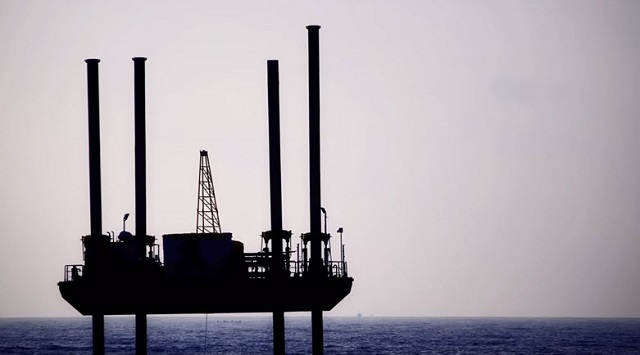Offshore Lease Sale Draws Mixed Crowd

Wednesday’s oil and gas lease sales in the Gulf of Mexico garnered $156 million in support and a group of concerned citizens in protest.
The sale involved 128 tracts covering 693,962 acres in the Central Planning Area of the Outer Continental Shelf offshore Louisiana, Mississippi and Alabama. A total of 30 offshore energy 8companies submitted 148 bids.
Department of the Interior Assistant Secretary for Land and Minerals Management Janice Schneider says: “The Gulf remains a critical component of our nation’s energy portfolio and holds important energy resources that spur economic opportunities for Gulf producing states while reducing our dependence on foreign oil.”
The lease sales build on the first eight sales held under the Obama Administration’s Outer Continental Shelf Oil and Gas Leasing Program for 2012-2017 (Five Year Program) that offered more than 60 million acres for development and has garnered, to date, $3 billion in bid revenues and awarded 1,071 leases.

Environmentalists Rally at New Orleans Superdome
Coinciding with the sale, hundreds of Gulf Coast residents, supported by local and national environmental and social-justice groups, rallied at the Superdome in New Orleans.
The rally amplified the call to end new fossil fuel leases and support a just transition away from fossil fuels for Gulf communities, especially those living on the coast.
The lease sale leaves the Gulf and Arctic open to dirty and dangerous fossil fuel extraction projects, said the Center for Biological Diversity in a statement. Last week groups sent a letter to President Barack Obama asking him to cancel the auction. The groups say that the sale will contribute significantly to global carbon emissions and that offshore drilling also threatens the well-being of Gulf Coast communities and wildlife. Out of more than 5,000 active federal oil and gas leases, most are in the Gulf.
In addition to ending new leases, Gulf residents also demand that the industry create at least 1,000 jobs to address its aging infrastructure and toxic legacy, particularly in communities of color.
The Superdome rally was built off the momentum of the national Keep It in the Ground movement, which has held similar actions across the country over the past year. The movement has had significant victories already, including a recent win by Atlantic Coast residents to protect their shores in the five-year offshore drilling plan. Last month Obama placed a moratorium on federal coal leasing to study its impacts on taxpayers and the planet.

Statements from groups and letter signatories
“The oil industry has drilled and polluted and destroyed the Gulf Coast for the last 100 years. Those of us who live here have let them get away with it. Today's action is historic precisely because of the past century of submission. We are telling Big Oil to take their rigs and go home. And we are telling our elected officials to get with it, to lead the transition from dirty energy to one that relies on wind and solar. Clean, safe jobs are the jobs we want; this is the future we want. If we don't grab it now, we risk being left behind in an oily puddle,” said Anne Rolfes, founding director of Louisiana Bucket Brigade.
“From the BP drilling disaster to the loss of coastal wetlands the size of Delaware, the Gulf has already paid too high a price for our nation's oil addiction. We're standing alongside over 66,000 Care2 members who have asked the Administration to admit all carbon is connected, and end new oil leasing in the Gulf of Mexico,” said Aaron Viles of Care2.com.
“If we’re to have any hope of protecting our coastal communities from the devastating effects of climate change and oil spills, we need to act now to keep fossil fuels in the ground. President Obama halted new offshore oil and gas leasing in the Atlantic, and he needs to do the same in the Gulf of Mexico and the Arctic,” said Blake Kopcho, oceans campaigner with the Center for Biological Diversity.
“In chilling foretelling, BP nicknamed its own Deepwater Horizon oil drilling lease ‘Macondo,’ the cursed town of mirrors in Gabriel Garcia Marquez' 100 Years of Solitude — and the story of generations doomed to repeat history. We are here to stop the next generation of oil and gas leases, break the curse and unite with communities to claim a fossil fuel free future,” said Janet MacGillivray, with Indigena.
Offshore Producers Remain Committed

Industry group’s NOIA President Randall Luthi has spoken out in support of the lease sales.
“Considering the current economic and regulatory environment, today’s Central Gulf of Mexico sale, though small, underscores the importance of offshore development to the U.S. economy and energy security. It is also a testament to thousands of workers who are dedicated to seeing that U.S. consumers are provided a choice of reliable and reasonably priced energy.
“It is easy to contrast these hard working professionals against the disruptive demonstrators at the Superdome today. If these protesters have the opportunity to visit more of the Gulf of Mexico, they will see just how important oil and natural gas is to the residents of the Gulf Coast. These are people that love to fish and recreate offshore; no one is more concerned with the environment, and they will do all they can to see that the oil and natural gas off their coast is developed safely.
“The Gulf of Mexico is the source of 20 percent of our domestic oil and natural gas supply, and this is energy for all of us. While it is everyone’s right to protest, many of the demonstrators could not have been here in New Orleans today without the oil and natural gas produced as a result of the very sales they oppose; it is difficult to overlook the irony.
“Even though today’s Eastern Gulf sale was a non-starter, and the Central Gulf sale saw the lowest industry interest in the history of such sales, the companies that stepped up and submitted bids demonstrated their commitment to staying in U.S. waters and producing home grown energy, despite a tough operating environment.
“Over the years, offshore lease sales in the Gulf of Mexico have contributed billions of dollars to the U.S. Treasury ($80 billion between 2005 and 2014), and recently that revenue stream began flowing to Gulf of Mexico states as well. What’s more, the Energy Information Agency (EIA) predicts that U.S. oil production in the Gulf of Mexico will reach record highs in 2017, which will continue to boost Gulf state economies. The success of oil and natural gas production in the Gulf of Mexico is the result of decisions made a decade or more ago. Efforts to restrict offshore development will have far reaching consequences that will echo long beyond this Administration.
“I find it peculiar that the same Federal department that will collect, distribute, and even spend the bonus bids submitted by industry today, took a proposed Atlantic lease sale off the table just last week. That short-sighted decision forfeits tremendous future economic benefits, risks our nation’s recently earned status as the global energy leader, and keeps nearly 87 percent of the U.S. outer continental shelf off limits to exploration, as it has been for decades.
“No other country along the Atlantic basin has so cavalierly closed off such large offshore areas. Canada, Cuba, Mexico, Greenland, Brazil and Ghana have all recognized the economic and energy security potential off their Atlantic coasts and have active offshore exploration programs. The U.S. should do the same. Instead, the short-sighted and premature removal of the Atlantic sale leaves the U.S. behind and in the dark about the economic and energy security potential of the oil and natural gas resources off our own Atlantic coast.
“Every reputable energy prediction shows that oil and natural gas will remain important and major parts of the world’s energy portfolio for the foreseeable future. Non-traditional energy sources, such as wind, waves and ocean currents should also be part of that portfolio, however many renewable energy technologies are years away from providing any tangible or affordable benefit for consumers. Even as renewable energy technologies mature, keeping oil and natural gas in the mix brings a diversity in energy sources that provides reliability and stability in both the price and supply of energy.”
